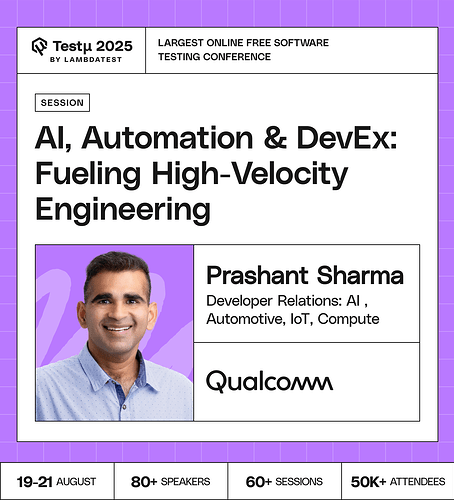Join Prashant Sharma as he explores how AI, automation, and developer experience (DevEx) are driving high-velocity engineering.
Discover strategies to accelerate development, streamline workflows, and enhance team productivity using AI-powered tools and automation practices.
Learn practical approaches to optimize engineering processes while maintaining quality and collaboration at scale.
 Don’t miss out, book your free spot now
Don’t miss out, book your free spot now
How can QA teams test AI features that don’t always produce the same output for the same input?
Are there ethical considerations and potential biases that need to be addressed when implementing AI and automation in the context of DevEx?
From your experience, what’s one AI-testing initiative that exceeded expectations—and one that didn’t? What should others learn from it?
What are the key metrics and indicators for measuring the success of AI and automation initiatives in boosting engineering velocity and also improving DevEx?
Can AI truly anticipate compliance or operational risks before they occur, or is it still more of a reactive tool?
Do you believe “autonomous testing” will ever be truly hands-free in finance, or will it always need human oversight?
What are the most effective strategies for identifying high-impact areas within an organization’s engineering processes to use AI and automation?
How do you see AI-driven automation reshaping developer experience — not just in terms of speed, but also in reducing cognitive load and preventing burnout in high-velocity engineering teams?
Copilot tracks prompts, code generated, and code accepted, while Cursor doesn’t. For devs using AI chats or MCP servers with no tracking—how do companies still claim “x lines of code” or “y% AI-generated”?
How can teams use AI in automation without adding too much complexity for developers?
How can AI, automation, and developer experience practices come together to accelerate engineering velocity while ensuring sustainable quality and team productivity?
Can AI-powered automation improve not just code speed, but also the joy and creativity of engineering?
Should we adopt a new tool, or evaluate the pros and cons based on our existing code structure?
What do you recommend to folks moving from slower engineering companies to new high velocity ones?
How might AI-driven automation enhance developer experience beyond speed, specifically in lowering cognitive burden and supporting sustainable pace in fast-moving engineering environments?
What role does AI-driven automation play in improving developer experience, balancing speed with reduced mental strain and burnout prevention in high-velocity teams?
Will AI powered tools like KaneAI make traditional test automation frameworks like Selenium obsolete by 2026?
When testing AI features that don’t always give the same output for the same input, the key is to shift your mindset a bit. Instead of expecting a single “correct” answer, think in terms of patterns or ranges of acceptable behavior.
You can run the same test multiple times and look for trends or statistical patterns rather than exact matches. Using tolerance bands helps you spot outputs that are way off, and anomaly detection can flag anything unusual. Also, make sure to log all the outputs—over time, this will give you a clearer picture of how your AI behaves and where it might need adjustments.
Absolutely! When we bring AI and automation into developer experience, it’s not just about making things faster, it’s also about making sure it’s fair and unbiased. For example, AI could unintentionally favor certain workflows or developers, or create feedback loops that keep reinforcing the same patterns. To avoid this, it’s important for QA teams to keep an eye on these biases. Using explainable AI, maintaining audit logs, and feeding the system with diverse datasets are practical ways to make sure automation works fairly for everyone. Think of it like building a helpful teammate, you want it to support the whole team, not just a few people.
![]() Don’t miss out, book your free spot now
Don’t miss out, book your free spot now